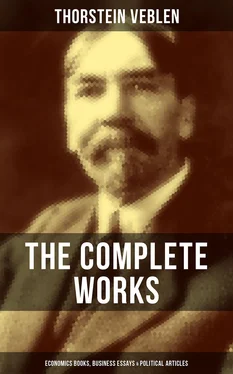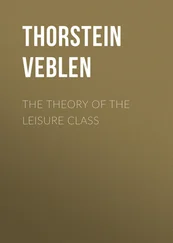Chapter 4.
Conspicuous Consumption
Table of Contents
In what has been said of the evolution of the vicarious leisure class and its differentiation from the general body of the working classes, reference has been made to a further division of labour,—that between the different servant classes. One portion of the servant class, chiefly those persons whose occupation is vicarious leisure, come to undertake a new, subsidiary range of duties—the vicarious consumption of goods. The most obvious form in which this consumption occurs is seen in the wearing of liveries and the occupation of spacious servants' quarters. Another, scarcely less obtrusive or less effective form of vicarious consumption, and a much more widely prevalent one, is the consumption of food, clothing, dwelling, and furniture by the lady and the rest of the domestic establishment.
But already at a point in economic evolution far antedating the emergence of the lady, specialised consumption of goods as an evidence of pecuniary strength had begun to work out in a more or less elaborate system. The beginning of a differentiation in consumption even antedates the appearance of anything that can fairly be called pecuniary strength. It is traceable back to the initial phase of predatory culture, and there is even a suggestion that an incipient differentiation in this respect lies back of the beginnings of the predatory life. This most primitive differentiation in the consumption of goods is like the later differentiation with which we are all so intimately familiar, in that it is largely of a ceremonial character, but unlike the latter it does not rest on a difference in accumulated wealth. The utility of consumption as an evidence of wealth is to be classed as a derivative growth. It is an adaption to a new end, by a selective process, of a distinction previously existing and well established in men's habits of thought.
In the earlier phases of the predatory culture the only economic differentiation is a broad distinction between an honourable superior class made up of the able-bodied men on the one side, and a base inferior class of labouring women on the other. According to the ideal scheme of life in force at the time it is the office of the men to consume what the women produce. Such consumption as falls to the women is merely incidental to their work; it is a means to their continued labour, and not a consumption directed to their own comfort and fulness of life. Unproductive consumption of goods is honourable, primarily as a mark of prowess and a perquisite of human dignity; secondarily it becomes substantially honourable to itself, especially the consumption of the more desirable things. The consumption of choice articles of food, and frequently also of rare articles of adornment, becomes tabu to the women and children; and if there is a base (servile) class of men, the tabu holds also for them. With a further advance in culture this tabu may change into simple custom of a more or less rigorous character; but whatever be the theoretical basis of the distinction which is maintained, whether it be a tabu or a larger conventionality, the features of the conventional scheme of consumption do not change easily. When the quasi-peaceable stage of industry is reached, with its fundamental institution of chattel slavery, the general principle, more or less rigorously applied, is that the base, industrious class should consume only what may be necessary to their subsistence. In the nature of things, luxuries and the comforts of life belong to the leisure class. Under the tabu, certain victuals, and more particularly certain beverages, are strictly reserved for the use of the superior class.
The ceremonial differentiation of the dietary is best seen in the use of intoxicating beverages and narcotics. If these articles of consumption are costly, they are felt to be noble and honorific. Therefore the base classes, primarily the women, practice an enforced continence with respect to these stimulants, except in countries where they are obtainable at a very low cost. From archaic times down through all the length of the patriarchal regime it has been the office of the women to prepare and administer these luxuries, and it has been the perquisite of the men of gentle birth and breeding to consume them. Drunkenness and the other pathological consequences of the free use of stimulants therefore tend in their turn to become honorific, as being a mark, at the second remove, of the superior status of those who are able to afford the indulgence. Infirmities induced by over-indulgence are among some peoples freely recognised as manly attributes. It has even happened that the name for certain diseased conditions of the body arising from such an origin has passed into everyday speech as a synonym for "noble" or "gentle". It is only at a relatively early stage of culture that the symptoms of expensive vice are conventionally accepted as marks of a superior status, and so tend to become virtues and command the deference of the community; but the reputability that attaches to certain expensive vices long retains so much of its force as to appreciably lesson the disapprobation visited upon the men of the wealthy or noble class for any excessive indulgence. The same invidious distinction adds force to the current disapproval of any indulgence of this kind on the part of women, minors, and inferiors. This invidious traditional distinction has not lost its force even among the more advanced peoples of today. Where the example set by the leisure class retains its imperative force in the regulation of the conventionalities, it is observable that the women still in great measure practise the same traditional continence with regard to stimulants.
This characterisation of the greater continence in the use of stimulants practised by the women of the reputable classes may seem an excessive refinement of logic at the expense of common sense. But facts within easy reach of any one who cares to know them go to say that the greater abstinence of women is in some part due to an imperative conventionality; and this conventionality is, in a general way, strongest where the patriarchal tradition—the tradition that the woman is a chattel—has retained its hold in greatest vigour. In a sense which has been greatly qualified in scope and rigour, but which has by no means lost its meaning even yet, this tradition says that the woman, being a chattel, should consume only what is necessary to her sustenance,—except so far as her further consumption contributes to the comfort or the good repute of her master. The consumption of luxuries, in the true sense, is a consumption directed to the comfort of the consumer himself, and is, therefore, a mark of the master. Any such consumption by others can take place only on a basis of sufferance. In communities where the popular habits of thought have been profoundly shaped by the patriarchal tradition we may accordingly look for survivals of the tabu on luxuries at least to the extent of a conventional deprecation of their use by the unfree and dependent class. This is more particularly true as regards certain luxuries, the use of which by the dependent class would detract sensibly from the comfort or pleasure of their masters, or which are held to be of doubtful legitimacy on other grounds. In the apprehension of the great conservative middle class of Western civilisation the use of these various stimulants is obnoxious to at least one, if not both, of these objections; and it is a fact too significant to be passed over that it is precisely among these middle classes of the Germanic culture, with their strong surviving sense of the patriarchal proprieties, that the women are to the greatest extent subject to a qualified tabu on narcotics and alcoholic beverages. With many qualifications—with more qualifications as the patriarchal tradition has gradually weakened—the general rule is felt to be right and binding that women should consume only for the benefit of their masters. The objection of course presents itself that expenditure on women's dress and household paraphernalia is an obvious exception to this rule; but it will appear in the sequel that this exception is much more obvious than substantial. During the earlier stages of economic development, consumption of goods without stint, especially consumption of the better grades of goods,—ideally all consumption in excess of the subsistence minimum,—pertains normally to the leisure class. This restriction tends to disappear, at least formally, after the later peaceable stage has been reached, with private ownership of goods and an industrial system based on wage labour or on the petty household economy. But during the earlier quasi-peaceable stage, when so many of the traditions through which the institution of a leisure class has affected the economic life of later times were taking form and consistency, this principle has had the force of a conventional law. It has served as the norm to which consumption has tended to conform, and any appreciable departure from it is to be regarded as an aberrant form, sure to be eliminated sooner or later in the further course of development.
Читать дальше












